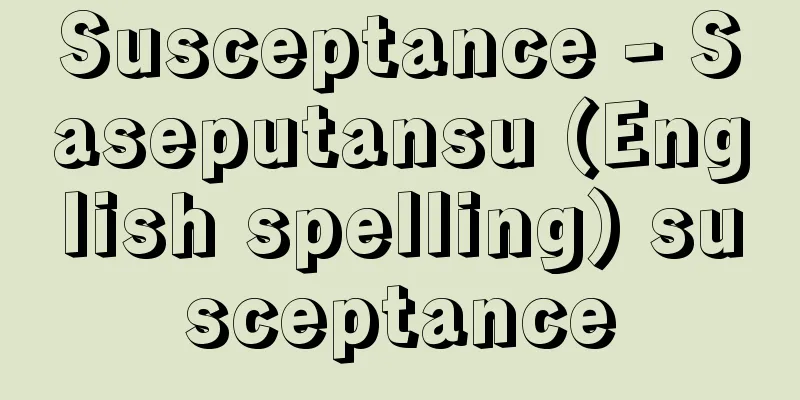Doctor - Doctor

〘noun〙① A person who is well versed in a field such as learning or the arts. A person with deep knowledge and great insight. A person with the ability to teach others. Hakushi. *Chronicles (720), before Kōtoku ascended the throne (Kitano Honin), "The Emperor of Ameyorotsutoyohi (abbreviated) loved Confucian scholars (hakase ) ." [Sengoku Sekaku - Zhao Sekaku]② A title of official position or status. → Hakushi. (i) In ancient times, the title given to experts in academics and technology sent from Baekje. Doctor of the Five Classics , Doctor of Medicine, Doctor of the Changes , Doctor of Calendars, Doctor of the Dew Table , Doctor of Tile, etc. (b) A title given to a leading intellectual. → Doctor of the province. ※ Chronicles (720), First month of the first year of Shucho (Kitanohon Nanbokuchokun) "Summoned various talented people , scholars , onmyoji (exorcists ) , physicians, and more than twenty people" (Ha) Under the ritsuryo system, a general term for positions that specialize in a specific academic field or art and are responsible for education in that field. Or the person in question. The Daigakuryo had doctors of Myokyo, Kiden (literature), Myoho, Arithmetic, Music, and Calligraphy; the Onmyoryo had doctors of Onmyoji, Calendar, Astronomy, and Water Clock ; the Bureau of Medicine had doctors of Medicine, Female Doctors, Acupuncture, Massage, and Curse Prevention. Furthermore, Dazaifu and each province had Dazaifu doctors, Dazaifu Myoho doctors, and Kuni no Hakase doctors. *Ryo Gikai (718) - Official: "One Doctor. ( Two teachers, one teacher who teaches scriptures. One student who takes an exam during the course.)" (ni) - Used as a title for feudal lord Confucian scholars in the Edo period. *Kansai Sensei's posthumous manuscript (1821) - "A skinny man wearing a doctor's seal at first glance, with the name of a member of the Escape Party Monument" (ho) - Official title established at the University on July 8, 1869 ( Meiji 2 ). They taught students, compiled national history, translated Western books, and were in charge of hospitals and medical affairs. Also, the person in that position. Divided into three classes: Dai, Chu, and Sho. Later, due to a reform of the government system, they belonged to the University and the Ministry of Education, but were abolished on September 3, 1872. (he) - On April 5 , 1870 (Meiji 3 ), this title was changed to the Dai, Chu, and Sho missionaries among the missionaries. Due to the reform of the government system in 1872, this title was abolished along with the name of the missionaries. ③ Abbreviation of "Hakase's wife". ※Murasaki Shikibu Diary (c. 1010) January 1, Kanko 7th year "A female doctor of medicine, a professor of literature, was listening to the bells." ④ (Abbreviation of "Fushi Hakase (Fusi Hakase)") The rules of the verses of "utaimono" (songs) such as Heikyoku and Noh plays, or Shomyo (chanting) . Also, the notation of dots or lines written beside the lines to indicate this. Sumi score. Goma dots. ※Bunkidan (c. 1283) 3 "I met a female poet called Kyo and she gave me a note with a rhythm, so I sometimes sang with her." ⑤ Model. Exemplary. Standard. Criterion. ※Tsurezuregusa (c. 1331) 220 "The drawing from the time of the prince's reign is still in my possession, Hakase. It is the bell in front of the so-called Rokujido Hall." ⑥ A doctorate as a degree . *The Temperament of Contemporary Scholars (1885-86) by Tsubouchi Shoyo, 4 "I would like to become a doctorate student without any worries about making a living." [Additional note] In the "Nihon Shoki - August 15th year of the Ojin era," it is written, " Then the Emperor asked Naoki, "Is there a doctor greater than you?" In the Kitano original, this is pronounced "Fumiyomihito."DoctorSource: The Selected Edition of the Japanese Language Dictionary About the Selected Edition of the Japanese Language Dictionary Information |
〘名〙① 学問や芸道などで、その道に精通した人。深い知識や高い識見などをもっている人。人を教えるだけの力をもっている人。はくし。※書紀(720)孝徳即位前(北野本訓)「天万豊日(あめよろつとよひ)の天皇は〈略〉儒(ハカセ)を好みたまふ」 〔戦国策‐趙策〕② 官職・地位の称号。→はくし。(イ) 上代、百済から送られた学問技術の専門家の称号。五経博士(ごきょうはかせ)・医博士(くすしのはかせ)・易博士(やくのはかせ)・暦博士(こよみのはかせ)・露盤博士(ろばんのはかせ)・瓦博士(かわらのはかせ)など。(ロ) 指導的な識者に与えられた称号。→くに(国)の博士。※書紀(720)朱鳥元年正月(北野本南北朝訓)「諸の才人(かとあるひと)・博(ハカセ)・陰陽師(をんみゃうし)・医師者、并て二十余人を召して」(ハ) 令制で、特定の学術・技芸に専門的に従事し、かつその分野の教育を担当する職の総称。または、その人。大学寮に、明経・紀伝(文章)・明法・算・音・書の各博士、陰陽寮に、陰陽・暦・天文・漏刻の各博士、典薬寮に、医・女医・針・按摩・咒禁(じゅごん)の各博士があり、さらに大宰府および諸国にも、それぞれ大宰博士・大宰府明法博士および国博士(くにのはかせ)が置かれていた。※令義解(718)職員「博士一人。〈掌下教二授経業一。課中試学生上〉」(ニ) 江戸時代、藩儒の称として用いた。※寛斎先生遺稿(1821)一「腰痩初纏博士印、名逃空勒党人碑」(ホ) 明治二年(一八六九)七月八日、大学校に設けられた官名。生徒を教授したり、国史を編纂したり、洋書の翻訳にあたったり、病院や医薬関係のことなどをつかさどった。また、その官にある人。大・中・少の三階級に分かれた。のち、官制の改革により、大学、文部省に属したが、同五年九月三日廃止。(ヘ) 明治三年(一八七〇)四月五日、宣教使のうち、大・中・少宣教使を改称した呼び名。同五年の官制改革によって、宣教使の名称とともに廃止された。③ 「はかせ(博士)の命婦」の略。※紫式部日記(1010頃か)寛弘七年正月一日「くすりの女官にて、文屋のはかせさかしだちさいらきゐたり」④ (「ふしはかせ(節博士)」の略) 平曲、謡曲などの「うたいもの」、あるいは声明(しょうみょう)などの節のきまり。また、それを示すために文句のそばに書きしるす点や線の譜。墨譜。胡麻点。※文机談(1283頃)三「卿といひし哥女にあひて博士つけ拍子さしたりとて、ときどきうたひ侍き」⑤ 手本。模範。標準。規準。※徒然草(1331頃)二二〇「太子の御時の図、今に侍るをはかせとす。いはゆる六時堂の前の鐘なり」⑥ 学位としての博士(はくし)のこと。※当世書生気質(1885‐86)〈坪内逍遙〉四「糊口の道には懸念のなき、博士(ハカセ)学士になさまほし」[補注]「書紀‐応神一五年八月」には「於是天皇阿直岐に問て曰、如(も)し汝に勝れる博士亦有りや」とあり、北野本訓では「フミヨミヒト」とよまれている。
はく‐し【博士】出典 精選版 日本国語大辞典精選版 日本国語大辞典について 情報 |
>>: Khakas people - Khakas (English spelling)
Recommend
The Eighteen Temple Forests of Kanto
Eighteen Jodo sect training centers in the Kanto r...
Tango [town] - Tango
An old town in Takeno District, occupying the nort...
"Eishu Hakki"
…A record of sightseeing in natural scenery. Writ...
static random access memory
...In the future, it is expected that the capacit...
Qarawiyin Mosque
...Eventually, the two areas of the city came to ...
Criminal procedure
…The realization of rights in civil relations can...
Aungyetith Culture - Aungyetith Culture
…A culture of the Early Bronze Age, whose referen...
Power Transmission - Soden
This refers to the transportation of electricity ...
Fourier, Joseph
Born: March 21, 1768, Ozer [Died] May 16, 1830. Fr...
Gondola - Gondola (English spelling)
A light hand-operated boat used in the canals of ...
Hanyang Peak - Kanyoho
…A mountain in the northern tip of Jiangxi Provin...
WD
...He published two books, "SD" (abbrev...
Tiffany & Co. (English)
…[Yoshihisa Kitai]. … *Some of the terms mentione...
Kijitsuan - Kijitsuan
...The name comes from the fact that the founder ...
Hanahirinoki - Hanahirinoki
A deciduous shrub of the Ericaceae family (APG cl...









